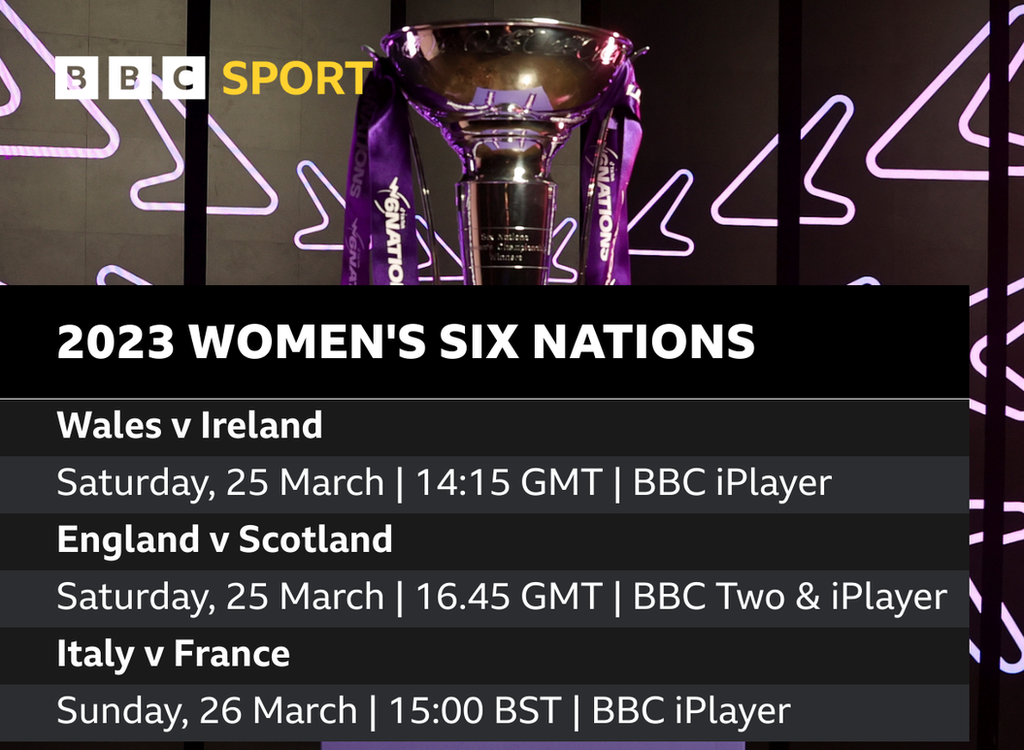Women's Six Nations 2023: Team-by-team guide to a ground-breaking tournament
- Published

England won a fourth successive Women's Six Nations in 2022
After a record-breaking World Cup, the 2023 Women's Six Nations is preparing to break new ground too.
For the first time, all teams in the tournament are offering some form of contract to the majority of their players.
After last year's World Cup was played a year late because of Covid-19, the 2025 tournament in England already feels close and a new cycle has brought change for many teams.
Here is everything you need to know about each side before the Women's Six Nations begins on Saturday.
England
Last year: 1st, Grand Slam
England are chasing a fifth straight Championship title and have not lost a Women's Six Nations match since France beat them in 2018.
They arrive in this year's tournament with the wound of a narrow World Cup final defeat by New Zealand still fresh.
A new era is around the corner, with record caps holder and captain Sarah Hunter retiring after Saturday's opener against Scotland and head coach Simon Middleton stepping down at the end of the tournament.
A new face will have to come in at fly-half too as Zoe Harrison is out for the rest of the season with a torn anterior cruciate ligament and Helena Rowland is still recovering from a foot injury sustained in England's World Cup campaign. Holly Aitchison - previously a centre for England - is expected to take the reins.
England have been professional since 2019 and flanker Alex Matthews says they want to "grow the gap" with other teams now that contracts are becoming widespread.
France will be the Red Roses' toughest opponents and their encounter at Twickenham - for which 35,000 tickets have already been sold - takes place on 29 April and is likely to be the tournament decider.
Lock Zoe Aldcroft said England "have to get over" their heartbreaking World Cup defeat "to be able to move forward".
"The new girls coming in have brought a really positive vibe," added Aldcroft.
"We're on the next journey now. We can't dwell on anything that happened before. It's all about going forward to 2025."

Wales v Ireland will be on BBC Radio 5 Sports Extra and England v Scotland will be on 5 Live
France
Lat year: 2nd
France's task will be, once again, to stop the England machine rumbling to another title.
Les Bleues narrowly missed out on a World Cup final last year and have had a shake-up since.
New coaches Gaelle Mignot and David Ortiz have come in. Star scrum-half Laure Sansus has retired and fly-half Caroline Drouin is focusing on sevens.
France great Jessy Tremouliere will retire from international rugby at the end of the tournament and new captain Audrey Forlani said "we're going to make sure she finishes on a high".
Wales
Last year: 3rd
Expectations are higher for Wales as they enter their second year of having professional contracts, with 25 full-time players this year.
Wales are likely to once again be in the battle for third place, with the gap to England and France not yet narrowed.
That battle has increased importance this year because World Rugby have launched a new global women's competition called WXV.
That competition will have three tiers and the top three teams in the Six Nations will compete in the top tier of WXV.
Wales captain Hannah Jones denied that contracts brought pressure to perform, but said the extra time professionalism brings has had a big impact.
"You've got time to eat, time to recover, time to pick up those conversations with coaches that you probably would have had to leave," she added.
Ireland
Last year: 4th
Ireland have also joined the contracts party, but not all players took the union up on them.
That may have been due to the level of pay and the fact that you have to play in Ireland rather than, for example, in England's more competitive Premier 15s league.
A new World Cup cycle is a fresh start after Ireland failed to qualify for the 2022 tournament - but the side will be missing several players who are with the sevens side as they bid for Olympic qualification.
Captain Nichola Fryday wants more than last year's fourth-place finish She said: "We want to keep building and getting that WXV qualification will be key for us.
"We've got a core group of experienced players that have been there the last few years. We're in a better place than last year."
Italy
Last year: 5th
Italy have a new coach in Giovanni Ranieri, while former captain Manuela Furlan has retired.
The Azzurre reached the World Cup quarter-finals for the first time last year and are also looking to build on increased investment from their union.
They have the toughest possible Six Nations start in France and England, something forward Silvia Turani jokeed will be "a nice warm-up".
Scotland
Last year: 6th
Last year was the year Scotland came close. So close that they earned losing bonus points against Wales, Italy and Ireland, but a lack of wins still left them bottom of the pile.
Captain Rachel Malcolm says they have had increased sports psychology support as they look to turn last-gasp defeats into victory.
"Close isn't good enough for us anymore," she said.
"We need to find a way to turn those results so we're on the right side of them."
Malcolm also suggested her team will produce something new in attack, with Chris Laidlaw joining as attack coach.
"Hopefully you'll see a slightly more exciting attack looking to move the ball a bit more and spread it a bit wider and manipulate defences a bit more," added Malcolm.